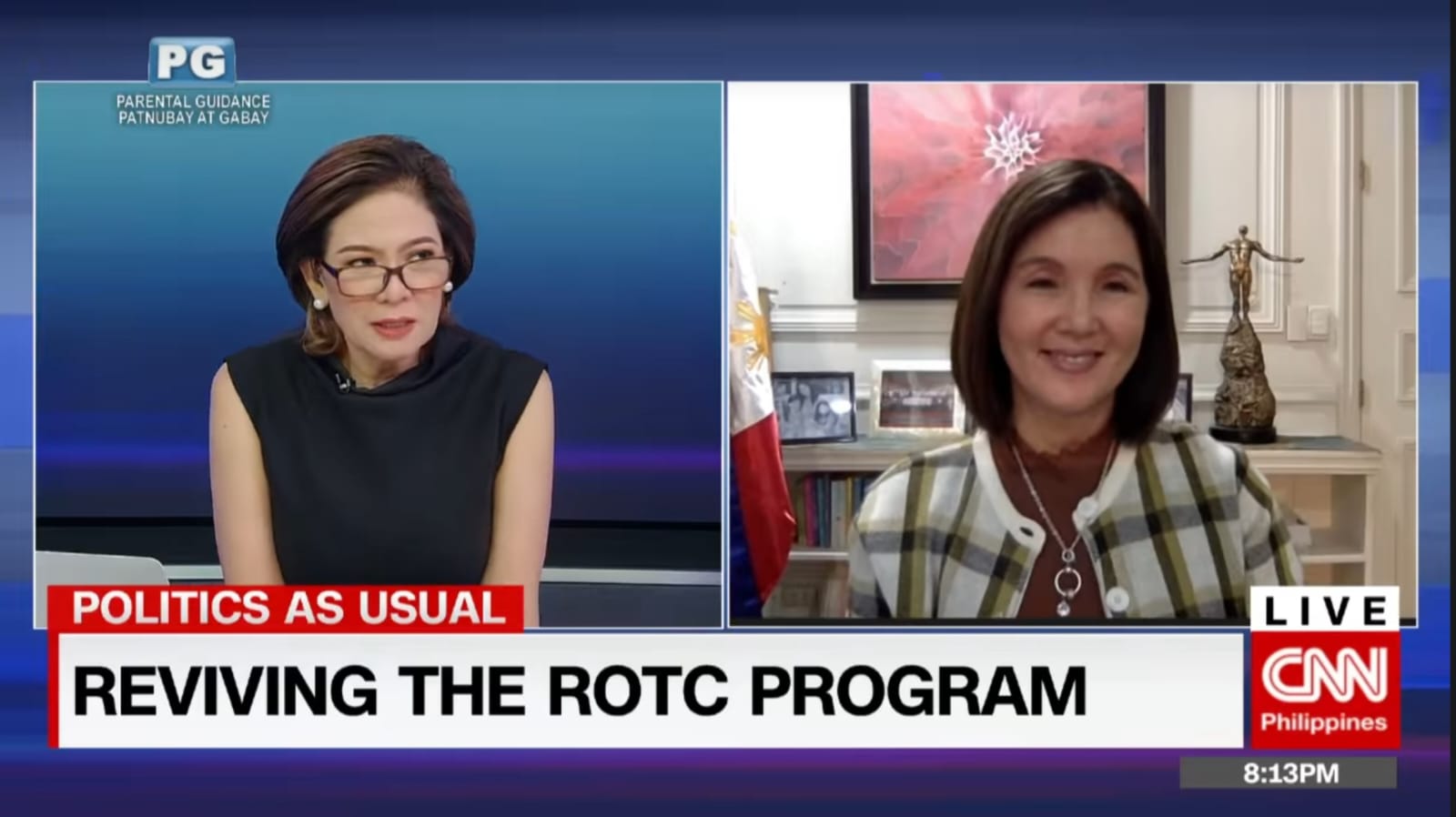Highlights of interview with Senator Pia S. Cayetano on the mandatory ROTC bill
Politics as Usual with Pia Hontiveros
CNN Philippines (February 1, 2023)
Pia Hontiveros (PH): You have no problem with ROTC (Reserve Officers’ Training Corps) as long as it is not mandatory? Or you don’t want it completely?
Senator Pia S. Cayetano (SPSC): As it stands, we have a law that includes ROTC. Have there been problems and issues on that? I have an open mind to hear. I am against it becoming mandatory. As to whether, as it is, it is doing its job, it is doing what it’s intended to be, I have an open mind. I’d like to hear. But I am against it becoming mandatory.
PH: There are bills in the Senate that are for mandatory ROTC..
SPSC: Yes, you are right, the bills that are currently being taken up in the Senate are for the return of mandatory ROTC. And my position is after reviewing all the bills and also hearing the statements of all the senators and resource persons who attended, basically I can summarize their position as follows: they want a mandatory ROTC to instill discipline, to instill or promote patriotism and unity, basically, and number two, to have a reserve corps that will be able to serve the country in its needs in case of an invasion.
As to the first objective, instill discipline. I’ll just point us to the last Southeast Asian Games which we hosted and we were the overall champions. I’ll point to the Olympics where a lot of our Filipino athletes came home with medals, including Hidylyn Diaz. Were we not most united? Were we not most patriotic and proud to be a Filipino when we saw and cheered for these athletes? So clearly, sports instills patriotism, and obviously, those athletes wouldn’t be where they are today if not for discipline. And I can say the same for the arts, and for music, right? So I don’t think ROTC has a monopoly in terms of being able to instill discipline.
And as to the second objective, to create that corps that will defend the country, what are we fighting against? What are the security threats that we face? Because again, when I read the bill, it felt like I was transported a hundred years ago., where Filipinos were fighting with bow and arrows, maybe later on, rifles, to literally defend our nation. Is that the same threat that we have? It could be. I am not saying walang threat na ganun.
But aren’t our threats now chemical warfare, cyber attacks, food security? Sibuyas nga lang wala na tayong supply. Itlog nga lang, which is a big source of protein, people would be starving without food. Water security, that is major because no one in this world can live without water. These are serious ‘security threats.’
And I humbly submit, I may not have the military training as our esteemed guests in our hearings, but I was a scholar of the US Defense in the Asia-Pacific Center for Security Studies. And when I went there, our topics were all about soft security. Sinabi ko nga, food security, water, the effects of climate change, disaster risk. So if we now have warm bodies, and I am referring to the college students who want to study the sciences so that they can protect us against chemical warfare, they can protect us against viruses, should we not allow them to give all their heart and mind and time to the pursuit of these studies? Eh may shortage na nga tayo ng nurses. May shortage na nga tayo ng iba-ibang health professionals, pharmacists, midwives, doktor – lahat yan shortage. And these are not easy courses. And then, we’ll put now additional units to take them away from it. So medyo it boggles my mind. I am trying very hard to be logical in understanding and digesting the logic, but medyo hindi ko masundan ang premises dito na, ano ba yung kalaban? Ano ba yung security ng Pilipinas na kailangan nating paghandaan? And I am prepared to study it further, but I’d like to get more clarity on these things.
PH: If it ain’t broke, don’t fix it? Let’s not change things na?
SPSC: That’s one way of putting it, Pia. But again, I’m very happy for them to review what our current ROTC program is like, what is the current NSTP program. But to now introduce mandatory ROTC… for example, it says in all the bills, they will exempt persons with disabilities. So the assumption is, it’s a physical exercise. Kasi if you’re exempting these people with physical disabilities, then that means physical kasi yung activity. Eh diba nga yung wars of the future, it could be online? It could be a cyber attack. So parang I don’t feel na we are thinking of the current situation or even the future when we are discussing ROTC again.
As to service to the nation, of course, I think we can all do our part in that. And again, there are different ways of serving the country. And again and again, they refer to disaster risk. Do you really have to have ROTC training to become a volunteer for disaster risk? It would help, and it would be great if that’s the track that you want. But you can participate in disaster risk in many, many ways. You could be a scientist preventing disasters from happening. You could be a teenage volunteer who is monitoring, understands how the sea levels rise. There are different ways. I just have a problem with the argument that ROTC is the way to instill discipline and ROTC is the way to solve our security. There are other ways din naman, let’s not be close-minded naman.
PH: There are different versions in the House and in the Senate…
SPSC: You know, actually, I am chairing a hearing on the Medical Reserve Corps. And this is a priority measure as well, it was mentioned in the SONA. This is also a product of the experiences we had in the pandemic. So walang problema doon. I have no issue, and I may have a similar view with Mr. Guido Delgado [UP Vanguard National Commander, who was earlier interviewed] na we have to have a reserve corps of some sort. But wouldn’t we want a reserve corps that voluntarily wants to be doing that?
This medical reserve corps, kapag may interes ka dyan, you don’t have to be a doctor, you don’t have to be a nurse, but you can be given special training in health, in medical emergencies. Dito sa disaster risk, you can also be given special training, and you volunteer. Why don’t we promote that? Tingnan natin where people want to be, instead of this concept na military.
And on that note, maraming bansa na walang compulsory. Let’s not think na napag-iiwanan tayo because hindi compulsory ang ROTC. We must focus on what our strengths are. And we’ve always said our strength is the FIlipino, the people. So what are those characteristics that we have that we can maximize? Magaling talaga tayo a IT, so baka naman yan ang maging strength natin against whatever threats we will face in the future. So that is the position that I would like to put forward. #




Leave a Reply